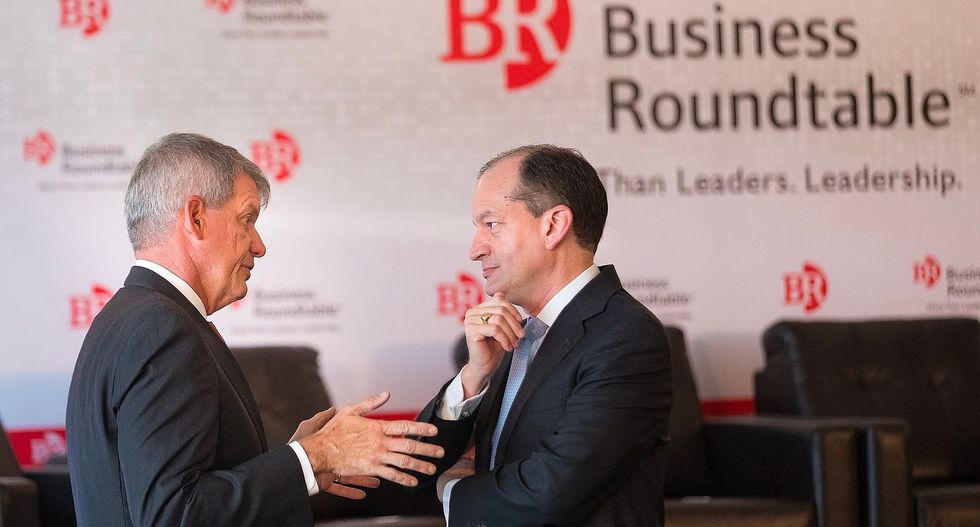Top CEOs warn shutdowns and low immigration are stunting research, technology and US competitiveness


On Wednesday, the Business Roundtable, a collection of top CEOs chaired by JPMorgan Chase head Jamie Dimon, issued a report warning about the future of U.S. innovation and global competitiveness, focusing on the lack of American investment in research and development as other countries like China pull ahead. The report warns the U.S. "has grown complacent — resting on legacy achievements while underinvesting in the drivers and enablers needed to build on these achievements in the future."
To some degree, the report is typical boilerplate corporate America thinking. It recommends increasing government investment in research, improving education, and streamlining and cutting regulations. It also conspicuously does not address corporate consolidation and the decline of antitrust enforcement, which has made these incumbent corporations rich, but which studies show has also cut research investment and entrepreneurship.
One eye-opening aspect of the report, however, was the thinly-veiled shot at Washington leaders for letting partisan fights get in the way of problem-solving — and shutdowns were a key part of it.
The report complains that "dysfunction in Washington abounds — from shutdowns to the inability to work together to solve America’s big challenges," and that "Tight budgets, policy challenges and competing priorities have caused political leaders to avoid or postpone critical investments in human capital and R&D."
President Donald Trump's current shutdown, which was precipitated by his demand for $5.7 billion in funding for a border wall, shows no sign of ending, even though it is predicted to cost the government $6 billion to stay closed through this Friday. The human consequences are growing severe as 800,000 federal workers are stuck without pay and millions of people risk losing food and housing assistance.
One of the lesser-known effects of the shutdown, however, is on science. The National Science Foundation has not issued any grants for over a month, depriving scientists and academics of hundreds of millions of dollars, and many researchers who work directly for the government, like those at the National Oceanic and Atmospheric Administration, the Environmental Protection Agency, and the U.S. Geological Survey are among the federal workers missing paychecks, and hundreds of postdoctoral fellows are missing their stipends.
The Business Roundtable Report does not just repudiate shutdowns, but a key aspect of the Trump agenda itself: cutting immigration. "The United States has both a high demand for and a largely untapped global supply of skilled labor, but the mechanism to connect the two — the immigration system — is broken," says the report. "Failure to continue to attract top global talent to the U.S. labor force represents a missed opportunity for the United States to strengthen its competitive edge in innovation."
Trump and his allies have long claimed they support "skilled" immigration, just not the "unskilled" immigration the wall would supposedly prevent. But Trump has also pushed for ending family reunification laws, which give immigrants the stability to contribute to the economy, and his current proposal to end the shutdown would severely restrict the Deferred Action for Childhood Arrivals (DACA) program, even though many of the young immigrants in that program are "high-skilled."
If Washington wants to take heed of business leaders' warnings, their first step should be repudiating Trump's immigration agenda, ending the shutdown, and putting scientists back to work.